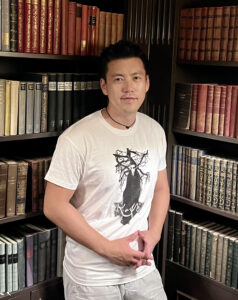This month we’re pleased to bring you poems by PEDRO POITEVIN translated from Spanish by PHILIP NIKOLAYEV and new work by 2025 Disquiet Prize finalists AIDEN HEUNG and ELLIE BLACK.
Table of Contents:
- Pedro Poitevin (trans. Philip Nikolayev), “Sonnet from the water before dawn” and “Self-Portrait as a Dog”
- Ellie Black, “The Confessional” and “Revelator”
- Aiden Heung, “The Theory of Evolution”

Photo courtesy of Pedro Poitevin
Sonnet from the water before dawn
By Pedro Poitevin
These waves that sneak their way into the cove’s
elusive refuge wrapped in chiaroscuro
land as caresses on the meager shore
of rock and sand as they arrive in droves.
A baroque liquid consciousness evolves,
bursting the tightness where it was immured,
dissolving all in an antique and pure
blue tune the water plays and my ear loves.
I mount the board, I set it free, and, turning,
the paddle paints a swirl on the receding
page of perpetual flux that streams behind.
Sweet Calliope, I’d like to tell you things
but remain silent, though I do succeed in
paddling toward the edges of your mind.
Translated from the Spanish by Philip Nikolayev
Soneto desde el agua en madrugada
Las olas que se cuelan por la boca
de esta ensenada bajo luz ambigua
llegan como caricias a una exigua
playa de arena gris a ras de roca.
Una conciencia líquida y barroca
vulnera la estrechez que la amortigua
y mi oído la busca en esa antigua
melodía en azul que el agua toca.
Yo me monto en la tabla y desencallo.
Giro y el remo escribe un remolino
sobre un folio en deriva permanente.
Algo quiero decirte, pero callo,
Calíope querida; sólo atino
a remar rumbo al borde de tu mente.
Self-Portrait as a Dog
By Pedro Poitevin
Unlikely hand that holds the leash – the limit –
of my free will: let go, but not forever,
release me, toss the ball into the river,
I wish to splash like a true poet in it.
Generous, loving hand that steers me here
clear of the pitfalls of euphoric vanity:
have mercy, safeguard me against insanity,
please let another dog come sniff my rear.
And when the sun sets, take me to the park,
where during your nocturnal game of chess
I’ll doze off by your side in meek delight.
Waking, I walk home with you in the dark,
where other loosely running dogs bark death –
I’ll only lick your face, beloved life.
Translated from the Spanish by Philip Nikolayev
Autorretrato Como Perro
Inverosímil mano que sujeta
la correa que acota mi albedrío:
suéltame y lanza esa pelota al río
pues quiero chapotear como poeta.
Mano amorosa que me lleva al cerro
y me protege de mi euforia vana:
apiádate y permite esta mañana
que venga a olerme el culo ese otro perro.
Llévame luego al parque: me divierte
yacer al lado tuyo en tu partida
nocturna de ajedrez. Cuando despierte,
regresaré contigo a tu guarida,
y aunque otros perros sueltos ladren muerte,
yo sólo he de lamerte, amada vida.

Photo courtesy of Ellie Black
The Confessional
By Ellie Black
I till the land of myself. I land myself
the role of me. I stand in the way
of myself. I weigh myself. By
way of myself, I sand myself
down. I drown myself
and watch myself drown. I roll
myself up a hill. I frown
and erase myself, redraw myself,
revise myself. I revive myself
and start again from the beginning.
I perform myself. I mourn myself.
I spite and spurn and scorn myself.
I ride the carousel of myself
and can’t get off. I only care
about myself. I doubt myself
but cart myself around. I cant,
recant myself. I chant myself,
change, rearrange myself,
I estrange myself. I leave
myself. I don’t believe in
myself—I’m self-agnostic. I
accost myself; I cost myself.
I prognosticate: I off
myself. Reader, to you,
I sell myself. I self myself
with a hammer
until you get it.
Revelator
By Ellie Black
O tell me who is that writing? John the Revelator
Writing in the book of seven seals
John this song I sing you you sing me.
This song I sing you you sing me this song.
The world comes to an end the world comes to.
I come to you this world an end to you.
I write an end I write an end to you.
I write the book I write I do reveal.
I seal the seven seals unseal the seals.
The book I write I sing I tell the end.
I see the end I see I seal I send.
I write the book of shame I am ashamed.
I tell you I reveal I am ashamed.
I pray to you I pray for you I pray.
Pray tell me I tell you what do I say.
What do I sing for you what do I write.
What John are you what sight have you what sight.
What John am I now am I what I write.
I am a different John not beloved.
Who is the man the god the ghost you loved.
I am the man I have and have not loved.
I am no earthly man I look above.
I see into the end I look I look.
The book reveals the book reveals the book.
I revelate the version that I write.
I sing a visitation come to light.
Things heavenly come down to earth and run.
I will it now I will the end be done.
To god you speak I speak god speaks through you.
Through me the angels sing I god-write you.
What light comes down the sight that ends the sky.
You see I see what’s real not you or I.
John sing with me the book the end I write.
The end I write is not an end in sight.

Photo courtesy of Aiden Heung
The Theory of Evolution
By Aiden Heung
You reap what you sow, the first English idiom I learned
from an American teacher. But he didn’t know
I would kiss any blade pointed at me just to live.
Three years into work, I wanted what I was promised.
I kept a knife in my smile. I bent rules for a cent more.
I could speak three languages to entertain foreigners.
I got a raise. I became a supervisor. I demanded cigarettes
paid by my subordinates. Shanghai offered the sugar-
coated bait and I needed something sweet.
I could be nice too. I bought colleagues beers, got them
drunk, had girls dance on our laps. I was younger.
I called them brothers but lost contact with them a year later.
A year later I moved to an office that shot up onto a murky sky.
I wore a suit and sipped Sauvignon. I slept with pretty men.
Everyday I waited for my orders from the dutch headquarters.
The email would arrive at 5 pm sharp. They knew my worth.
I knew they knew. I warped my face to the setting sun
and saw smog. On the horizon a single red light looked
perishable. My reflection gave back the face of a beast.
There were teeth. There was prey—I called it myself.
Born (accidentally) in Freiburg, Germany, but raised in his country of origin, Guatemala, Pedro Poitevin is a bilingual poet, translator, and mathematician. His English-language debut collection, Nowhere at Home, was published by Penteract Press in 2023. Poitevin’s poems, which often employ traditional forms to engage with contemporary themes, have appeared in Rattle, River Styx, and other notable journals. He is the author of five books in Spanish, including Letras griegas and the experimental Ícaro hace piruetas en las nubes, which explores palindromic poetry. Poitevin’s poem “Sueño de la cercanía” won the 2021 Juana Goergen Poetry Prize. He currently teaches mathematics at Salem State University in Massachusetts.
Philip Nikolayev is a poet living in Boston. He was raised in Moldova and grew up multilingual. Today, he also speaks French, Romanian, Ukrainian, Hindi, and Urdu, and translates poetry from these languages and from Sanskrit. Nikolayev’s poetic works are published internationally, including in such periodicals as Poetry, The Paris Review, and Grand Street. His collections include Monkey Time (winner of the Verse Prize) and Letters from Aldenderry. His collection of poems in Spanish translation by Willy Ramirez and Pedro Poitevin, El poeta desde el balcon, has just been published in Latin America by Editorial Efimera.
Ellie Black is a PhD candidate in Creative Writing at the University of Mississippi, where she also received her MFA. Winner of the 2023 Pinch Literary Award in Poetry and a finalist for the 2025 Disquiet Prize in Poetry, she has had work published in Washington Square Review, The Drift, Ninth Letter, Mississippi Review, The Offing, Best New Poets, and elsewhere.
Aiden Heung (he/they) is a Chinese poet born in a Tibetan Autonomous Town. After years of working as a traveling salesman, he recently relocated to St. Louis, USA. His poems are published in The Kenyon Review, The Australian Poetry Journal, The Missouri Review, The Yale Review, The Harvard Review, Poetry International, etc. His poetry debut All There Is To Lose is the winner of 2024 Levis Prize in Poetry, chosen by Ilya Kaminsky, and it will be published by Four Way Books in Spring 2026.



